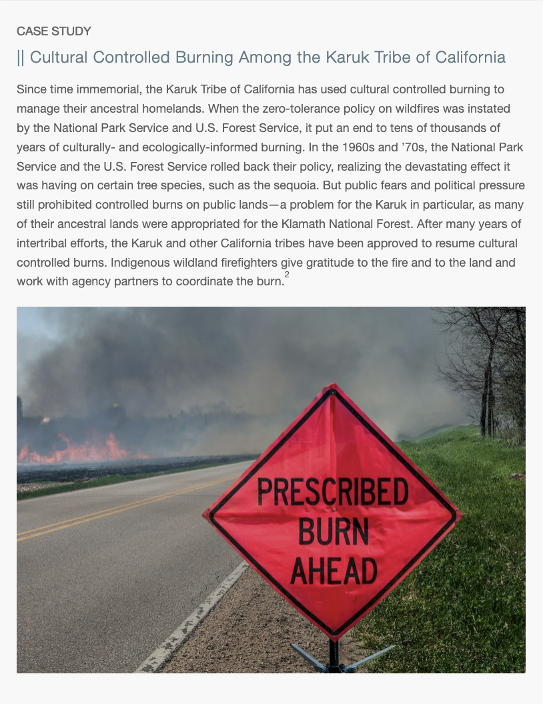
The Natural Hazards Center is pleased to announce the release of the twelfth training module in the CONVERGE series: Indigenous Sovereignty in Disasters. This module focuses on how colonialism impacts vulnerability to hazards and disasters among Indigenous peoples and how Indigenous sovereignty—or the right of Indigenous peoples to govern themselves—can help build resilience. Supported by the National Science Foundation, this free online course is part of a series of foundational and advanced training modules designed to enhance valuable knowledge and skills among students and other emerging researchers and practitioners.
Watch the CONVERGE demonstration webinar about the Indigenous Sovereignty in Disasters module.
Module Overview
The Indigenous Sovereignty in Disasters Training Module describes the historical legacy of colonialism in the United States and its territories and how this system marginalized and ultimately sought to extinguish Indigenous peoples. Drawing on empirical literature, it defines key concepts related to colonial systems and describes how current drivers of social vulnerablity—such as nutrition, health care, and education—are rooted in settler colonial structures.
“The poor disaster outcomes experienced by Indigenous communities, such as those we saw during the COVID-19 pandemic, are a direct result of contemporary manifestations of settler colonial structures,” said Hōkūlani Rivera (Kanaka Maoli), one of the lead developers of the module. “Federal law and policy, as well as our current capitalist system contribute to high rates of poverty, pre-existing health conditions, housing insecurity, and imprisonment among members of Indigenous communities. Despite, these vulnerabilities, we continue to resist and challenge these structures through our sovereignty and relationships with the land.”
The module showcases the multifaceted ways that Indigenous communities work to build resilience to hazards and disasters. For instance, Traditional Ecological Knowledge (TEK)—or the intrinsic knowledge Indigenous peoples have learned and retained over thousands of years related to the physical world and how to live as a part of it—can be used to better manage natural resources and adapt to climate change. Cultural controlled burning, described in the below case study highlight from the module, is one such example of how TEK contributes to enhanced disaster resilience.

The last section of the module focuses on engaging in ethical research and practice partnerships with Indigenous communities, with a specific focus on the role of trust and long-term participatory engagement in building research and emergency management collaborations between non-Indigenous and Indigenous partners. As a framework for ethical cross-cultural collaboration, it presents the 7R’s for education, research, and engagement with Indigenous communities. The framework was created by two of the module developers, Paulette Blanchard (absentee Shawnee/Kickapoo) and Michelle Montgomery (enrolled Haliwa Saponi/descendant Eastern Band Cherokee). This section also highlights the policies and procedures that shape how government agencies consult and work with Indigenous communities in emergency situations.
This module was originally issued as a nine-part course on Tribal and Indigenous communities' experiences of COVID-19 and climate change. Julie Maldonado, associate director of the Livelihoods Knowledge Exchange Network, said, “While the original course was meant to be delivered as part of undergraduate classes, including at tribal colleges and universities, the partnership with CONVERGE will allow us to reach a wider audience of hazards and disaster researchers and practitioners.” She continued, “This module can help educate users on how Indigenous peoples experience and work to combat the impacts of hazards and disasters, while emphasizing approaches to ethical and participatory research partnerships with Indigenous communities.”
To successfully complete the module, users must pass a 10-question quiz to receive a certificate worth one contact hour of general management training through the International Association of Emergency Managers (IAEM) certification program.
Users can visit the CONVERGE website for supplementary materials, including the CONVERGE Assignment Bank and Annotated Bibliographies. This is where previously released modules can also be accessed, including those focused on foundational topics, including Institutional Review Board procedures, conducting emotionally challenging research, cultural competence, collecting and sharing perishable data, social vulnerability, and disaster mental health. In addition, CONVERGE offers advanced trainings in specialized topics such as broader ethical considerations, reciprocity, gender-based violence in fieldwork, positionality, and public health implications of hazards and disaster research.
The next training modules to be released in the series include:
- Older Adults Across the Disaster Lifecycle
- Social Science Methods and Approaches for Hazards and Disaster Research
To receive updates and information on new CONVERGE training modules and other resources, please subscribe here.
About the Natural Hazards Engineering Research Infrastructure
Funded by the National Science Foundation, the Natural Hazards Engineering Research Infrastructure—NHERI—is a network of experimental facilities dedicated to reducing damage and loss-of-life due to natural hazards such as earthquakes, landslides, windstorms, and tsunamis and storm surge. It is supported by the DesignSafe Cyberinfrastructure. NHERI provides the natural hazards engineering and social science communities with the state-of-the-art resources needed to meet the research challenges of the 21st century.
Acknowledgements
This CONVERGE Training Module is based upon work supported by the National Science Foundation Natural Hazards Engineering Research Infrastructure (NSF Award #1841338). Any opinions, findings, and conclusions or recommendations expressed in this material are those of the authors and do not necessarily reflect the views of the NSF.